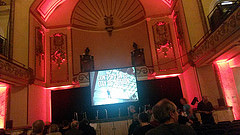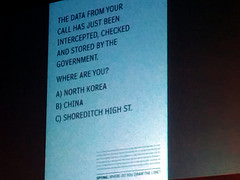Don’t Spy on Us: Day of Action, June 7, 2014
On Saturday, June 7, the Don’t Spy on Us campaign and The Guardian hosted a day of action to mark the anniversary of Edward Snowden’s revelations about mass surveillance by the NSA and GCHQ. ORG is a founding partner in the Don’t Spy on Us coalition, which also includes Article 19, Big Brother Watch, English PEN, Liberty and Privacy International.
Sponsored by F-Secure, the sell-out conference at Shoreditch Town Hall, London, was the biggest privacy event of the year.
The day began with a pre-recorded video message of support by performer Stephen Fry, who criticised the government for using the fear of terrorism as a “duplicitous and deeply wrong means of excusing something as base as spying on the citizens of your own country”. Next up was ORG co-founder Cory Doctorow, who suggested that increasing our own personal security online would increase the cost of spying to the extent that it would force the security agencies to become more targeted. In a later session, he also suggested that we need, “privacy for the weak, transparency for the strong”.
Other speakers included Guardian Editor, Alan Rusbridger and the journalist Ewen MacAskill, who gave incredible accounts of how the Snowden story broke – revealing that the New York Times had effectively created an ’embassy’ for The Guardian in its New York offices to ensure that the British newspaper was protected by the US constitution.
This was a day of action, not just words, and there were a number of breakout sessions that looked at practical ways that the Don’t Spy on Us campaign can persuade the public, government and media to do something about mass surveillance. Tim Duffy, CEO of M&C Saatchi, identified two reasons for public apathy over surveillance – many people are not aware of it and if they are, the fear of terrorism beats the fear of having their privacy invaded. Duffy made a number of suggestions for how the campaign can overcome these problems, including disclaimers on emails and apps.
In a separate session, Claude Moraes MEP, lawyer Mark Stephens, Cambridge University’s Ross Anderson and Emam Carr from Big Brother Watch listened to participants’ suggestions for new legislation that will protect our rights to privacy and freedom of expression. Meanwhile at a cryptoparty, volunteers (including a number of ORG supporters), showed attendees how to encrypt their emails.
The event ended on an upbeat note with Wikipedia founder Jimmy Wales reminding the crowd about effective collective action over SOPA and urging them not to feel powerless: “We know how to change the world. Let’s start doing it.” Shami Chakrabarti of Liberty said that if the courts, private business and people start to care, then politicians will start to care about mass surveillance. Security expert Bruce Schneier agreed that the solution will be political, saying that “laws can trump technology”.
ORG Executive Director, Jim Killock closed the day by asking people to not only sign and share the Don’t Spy On Us petition but also contact their MPs.
One year on, the government response to the Snowden revelations has been inadequate but with an election due next year, politicians are more sensitive to what the electorate wants. With your support, we can make sure they listen to what we are saying.
For more on the event, check out #Don’tSpyOnUs, which trended on Twitter all day on Saturday. You can also read blogs by Professor Ian Brown, Damian Gayle and Falling down the Orwell or see some of the press coverage in The Observer, The Telegraph, The Independent, The Times (£), The Daily Dot and Channel 4.


